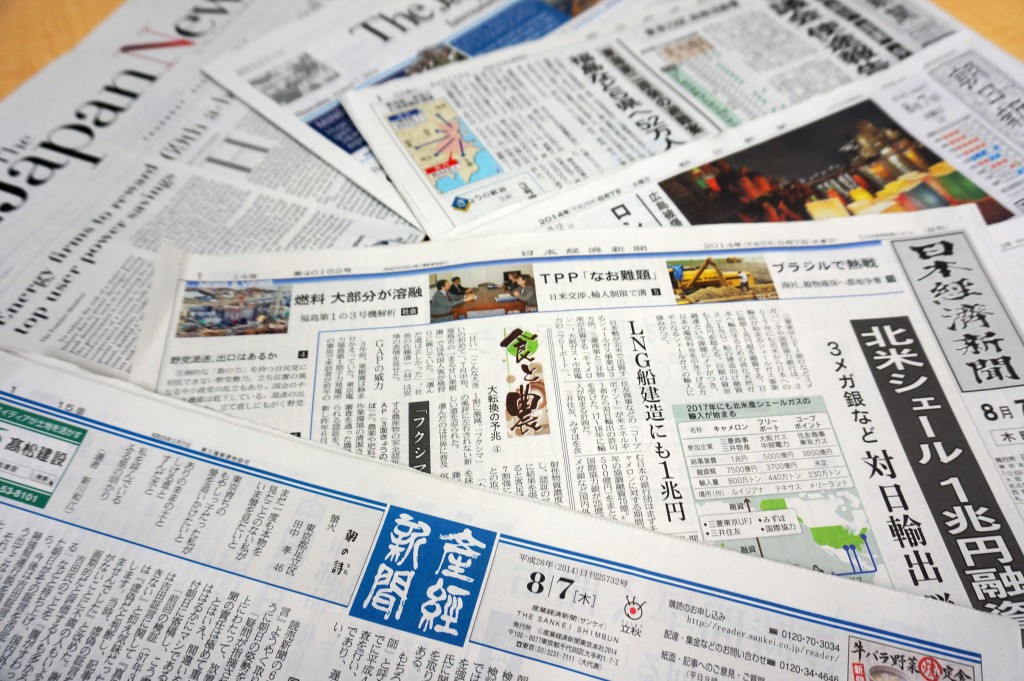Debate Between Political Party Leaders on Security Legislation Reform
Vol. 4 June 4, 2015
Asahi: “Abe’s responses to security questions smack of insincerity”
Sankei: “The DPJ should discuss responsible security policy”
Mainichi: “PM’s explanation of security legislation shows inconsistencies”
Yomiuri: “Deepen debate on deterrence between party leaders in Diet”
On May 20, Prime Minister and Liberal Democratic Party President Shinzo Abe held a debate with Democratic Party of Japan leader Katsuya Okada and two other leaders of opposition parties, beginning the debate in the Diet on a set of bills to significantly alter postwar Japan’s security policy. The new security bills would allow for exercising the right to collective self-defense, which former Cabinets have not recognized, and would expand the activities of the Self-Defense Forces to providing non-combat support to foreign armies. The opposition parties are expected to debate these points fiercely.
Among the opposition parties, the Democratic Party of Japan and Japanese Communist Party are attempting to prevent this legislation from passing, but the Japan Innovation Party is not necessarily in agreement with them. The Abe administration has taken an aggressive stance and postponed the end of this diet session until June 24 in an effort to pass the legislation this summer. Their goal is to have it pass the House of Representatives by the end of June and then pass the House of Councilors by the end of July.
Targets of criticism differ
Four of the five national dailies, except The Nihon Keizai Shimbun, took up the debate between the party leaders in their editorials on May 21. All of them agreed that the debate was lackluster, as the battle of words on security issues was largely disconnected, but the newspapers differed over who should be blamed for the uninspired performance.
The Asahi and The Mainichi both criticized Abe’s stance towards the debate, with The Asahi mentioning “Abe’s insincere replies…were designed to obscure the essence of questions” and The Mainichi saying “Prime Minister Abe would not give direct answers to questions about many of the key points of the bills.”
The Asahi indicated that if Abe continued to reiterate the same responses he has given so far, refusing to consider unanticipated situations and risks, then “the Japanese public will only grow more concerned about the historic shift in Japan’s security policy.” The paper insisted that “The Diet must not be allowed to pass the package of bills without winning public understanding and support. It must spend whatever time is needed for sincere debate on the proposed legislation.”
Regarding Abe’s explanation on the possibility of the SDF using force in other countries’ territories if allowed to exercise the right to collective self-defense, The Mainichi commented that “the prime minister provided generally vague explanations, already revealing inconsistencies involving the relevant bills.” The paper also pointed out that as the debate moves forward, “how far the DPJ will approve the SDF’s overseas activities will be called into question,” and concluded by saying that the “debate between [party] leaders [should be used] as a springboard to have constructive discussions.”
The Yomiuri Shimbun, discussing the same debate over use of force by the SDF as The Mainichi did, criticized the ways that Abe and Okada unfolded their arguments, by saying: “It is hard to imagine in what kind of contingencies Okada thinks the SDF could possibly use force in another country. On the other hand, Abe did not squarely respond to Okada’s question, leaving the two sides of their verbal battle disconnected.”
The Yomiuri also cautioned Okada, who commented “The risk for the SDF to be drawn into combat will drastically rise,” by saying “Discussion that would merely inflame public concern should be avoided.” To back up this statement, the newspaper explained, “The government will comprehensively take into account the local situation and other factors and decide on the area where the SDF unit will actually operate, and will obtain the approval of the Diet.”
The Sankei Shimbun, meanwhile, criticized Okada for not having a “realistic perspective” on the worsening of the security climate surrounding Japan. “We cannot help but harbor uncomfortable feelings about the stance of opposing everything [the government does],” The Sankei said. “In particular, it is disappointing that Mr. Okada repeatedly criticized the government bills without presenting specific alternative plans to enhance [the Japan-US alliance’s] deterrence. His argument lacks persuasiveness and his debate [with Abe] was disconnected.” The paper stated “We would like to see a fair debate that also considers the significant merits in this proposal,” such as increased deterrence for the Japan-US alliance.
Hopes for the JIP
The newspapers, except The Mainichi, touched on JIP leader Matsuno’s questions. The Yomiuri and The Sankei took up Matsuno’s comment that his party wants to have an “open discussion” with the administration about the revision of the Constitution. The Yomiuri said, “Building a relationship by being fair and just on each policy issue with the administration, thus deepening a forward-looking battle of words: The Japan Innovation Party should stick to this line as an opposition party, slightly differentiating itself from the DPJ.” The Sankei said, “We expect to see the party taking specific actions.”
The Asahi said: “Japan Innovation Party’s Matsuno made a strident call for careful deliberations on the bills extended over multiple Diet sessions. That’s a very reasonable demand.”
*English translations of The Yomiuri, The Asahi, and The Mainichi are from The Japan News, The Asia & Japan Watch and The Mainichi, respectively. Those for The Sankei are provisional. The content of this page was made by the Foreign Press Center Japan and does not reflect the opinion of the Japanese Government or any other organization.



